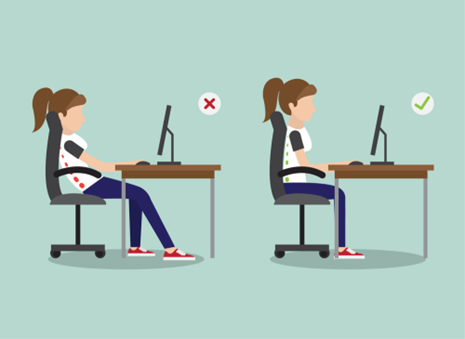By: Marie Serrado
“Stand up, Straight” “Don’t Slouch” are timeless pieces of advice we’ve all heard. Having a good
posture is vital for everyone. Good posture is essential for maintaining a healthy body and mind.
It involves aligning your body in a way that places the least amount of strain on your muscles,
joints, and ligaments. Posture is typically thought of as a static position, whereas, it can also be
looked as dynamic support against our friend Gravity. A poor posture places unnecessary strain
on our tissues, which can lead to pain and altered function. Physical therapy can help improve
posture in a variety of ways to restore proper strength and tension. Some muscles may need more strength, while others need to be stretched. Education on proper body mechanics with visual and hands on cueing can lead to our nervous system understanding what is good posture versus poor posture.
Some ways that physical therapy can help with improving your posture are:
1. Strength and Endurance Exercises: Physical Therapists can design a program targeting
appropriate musculature for better posture. We have to constantly fight gravity, therefore,
we need these muscles to withstand this stress throughout the day. Those exercises can
include planks or bridges. One practice, in particular, is called the Theraband Rows. With
this exercise,
-Sit up straight in a chair.
-Keep elbows very close to sides and pull back on a resistive band as shoulder blades
come back and down.
-Return to starting position slowly.
-Do two sets of 10 repetitions. You can build up to 3 sets of 20 repetitions as you
improve.

2. Stretching: Stretching can improve posture by lengthening shortened muscles. If we are
sitting at a desk all day, our spine is flexed forward and our tissues on the front of our
trunk tighten down, while our spine stiffens into this position. A great stretch to improve
this would be the back extensions.
-You can do this in standing or sitting
– Place your hands on your hips and bend backwards in a comfortable amount of motion
– Complete 10-15 repetitions several times a day.

3. Education: Physical therapists educate through verbal description, visual feedback, and
hands on cueing to provide fully understand good posture versus poor posture. Providing
this information can help individuals maintain good posture throughout the day.
Overall, physical therapy can be a valuable tool for improving posture by addressing underlying
muscle imbalances and providing patients with the knowledge and tools they need to maintain
good posture over the long term. It’s important to remember that everyone’s body is different, therefore, if you’re experiencing pain or discomfort because of poor posture or if you want to improve your posture for overall health and well-being, it’s always a good idea to consult a physical therapist. Here at Strive! Health and Rehab, we take the time to complete a thorough evaluation to determine what is best for each individual. Please reach out to us with any
questions or if you are interested in physical therapy care.
References:
1. Foothills Sports Medicine Physical Therapy. (2023, April 7). How to improve your posture
with stretches and exercises. Foothills Sports Medicine Physical Therapy. Retrieved April
27, 2023, from https://foothillsrehab.com/blog/how-to-improve-your-posture/
2. Department of Health & Human Services. (2003, December 24). Posture. Better Health
Channel. Retrieved April 27, 2023, from
https://www.betterhealth.vic.gov.au/health/conditionsandtreatments/posture
3. Posture strengthening exercises. Ergonomics. (2020, November 3). Retrieved April 27, 2023,
from https://ergonomics.ucla.edu/injuries-and-prevention/stretches/exercises/posture-
strengthening-exercises
4. Spinal Dysfunction. Spinal dysfunction. (n.d.). Retrieved April 27, 2023, from
https://www.nemours.org/services/spinaldysfunction.html#:~:text=The%20spinal%20cord%20carries%20signals,called%20%E2%80%9Cspinal%20dysfunction%E2%80%9D).
5. Why posture matters. Harvard Health. (2017, January 24). Retrieved April 27, 2023, from
https://www.health.harvard.edu/staying-healthy/why-good-posture-matters


